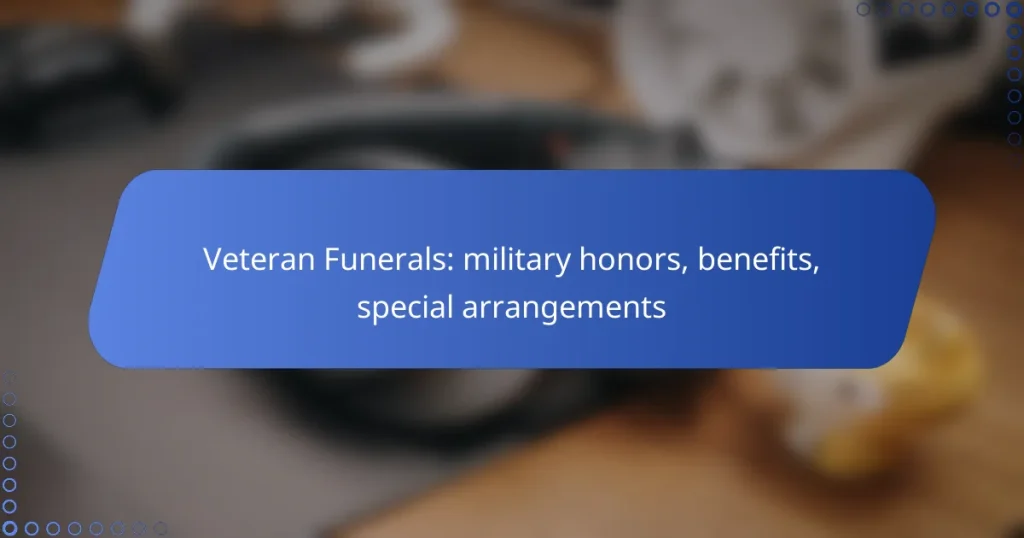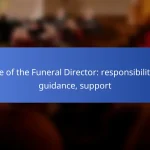Veteran funerals in Canada are designed to honor the service of military personnel while providing essential support to their families during a challenging time. These funerals include military honors, financial assistance, and eligibility for burial in national cemeteries, ensuring that veterans receive the recognition they deserve. Arranging such a funeral involves specific steps, including selecting a licensed funeral provider and planning for military honors and services.
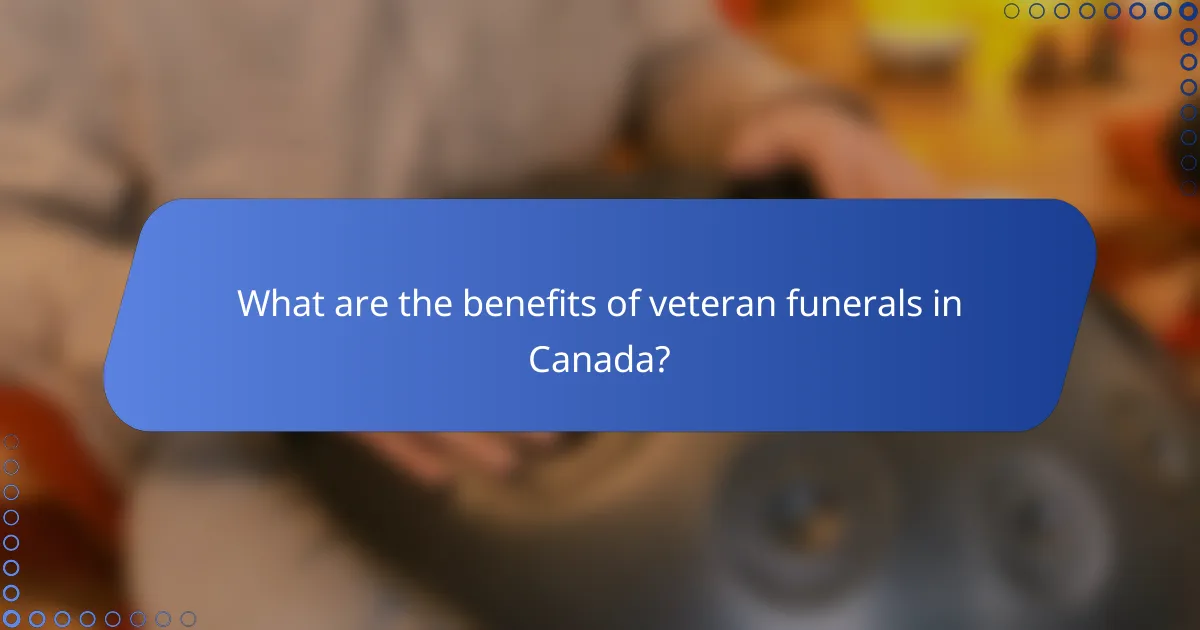
What are the benefits of veteran funerals in Canada?
Veteran funerals in Canada provide essential benefits that honor the service of military personnel and support their families during a difficult time. These benefits include access to military honors, financial assistance, eligibility for burial in national cemeteries, commemoration through memorial services, and support from veteran organizations.
Access to military honors
Veterans are entitled to military honors at their funerals, which may include a flag-draped casket, a military honor guard, and the playing of “Taps.” These honors serve to recognize the sacrifices made by the individual and provide a sense of dignity to the service. Families can request these honors through the appropriate military channels, ensuring a respectful farewell.
Financial assistance for families
The Government of Canada offers financial assistance to the families of deceased veterans, which can help cover funeral costs. This assistance may include a funeral grant and reimbursement for specific expenses related to the burial. Families should inquire about available benefits through Veterans Affairs Canada to understand what support they can receive.
Eligibility for burial in national cemeteries
Veterans are eligible for burial in national cemeteries, which provide a dignified resting place. These cemeteries often feature well-maintained grounds and memorials honoring military service. Families should confirm eligibility and the application process with Veterans Affairs Canada to ensure their loved one can be interred in a national site.
Commemoration through memorial services
Memorial services for veterans can be organized to honor their lives and contributions. These services may include tributes from family, friends, and fellow service members, as well as the presentation of medals or honors. Planning a memorial service can provide closure for families and celebrate the veteran’s legacy.
Support from veteran organizations
Various veteran organizations in Canada offer support to families during the funeral process. These organizations can provide resources, guidance, and assistance with arrangements. Families are encouraged to reach out to local veteran groups or national organizations like the Royal Canadian Legion for help navigating the benefits and services available to them.
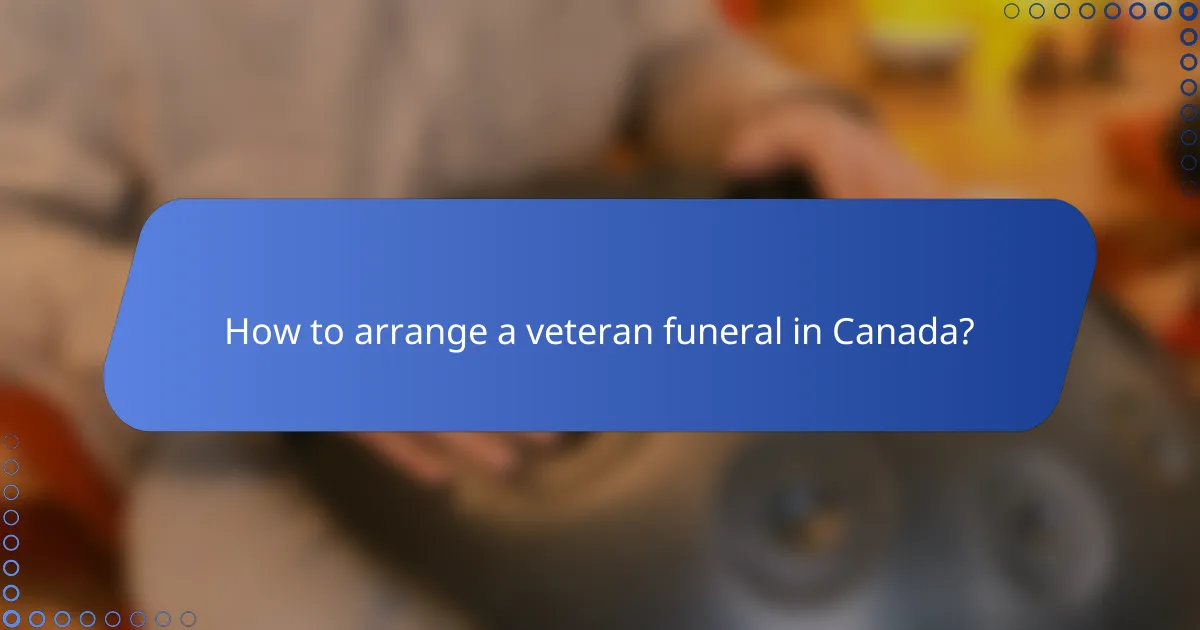
How to arrange a veteran funeral in Canada?
Arranging a veteran funeral in Canada involves several key steps to ensure that the deceased receives the appropriate honors and benefits. This process typically includes contacting a licensed funeral provider, gathering necessary documentation, choosing a burial or cremation option, and planning military honors and services.
Contact a licensed funeral provider
The first step in arranging a veteran funeral is to contact a licensed funeral provider. They can guide you through the process, help you understand your options, and ensure compliance with local regulations. Look for a provider experienced in veteran funerals, as they will be familiar with the specific benefits and honors available.
When selecting a funeral home, consider their reputation, services offered, and pricing. It’s advisable to compare a few providers to find one that meets your needs and budget.
Gather necessary documentation
To arrange a veteran funeral, you will need to gather essential documentation. This typically includes the veteran’s discharge papers (Form 214), identification, and any pre-arrangement documents if applicable. These papers are crucial for accessing military benefits and honors.
Make sure to have multiple copies of these documents, as they may be required by various agencies and service providers throughout the funeral planning process.
Choose a burial or cremation option
Deciding between burial and cremation is a significant choice in the funeral arrangement process. Veterans are eligible for burial in a national cemetery, which may offer benefits such as a grave marker and a burial flag. Alternatively, cremation is often chosen for its flexibility and lower costs.
Consider the veteran’s wishes, family preferences, and any associated costs when making this decision. If opting for burial, inquire about available plots in veterans’ cemeteries, as they may have specific requirements.
Plan military honors and services
Planning military honors and services is an essential aspect of a veteran funeral. This may include a flag presentation, a military honor guard, and the playing of Taps. These honors are a way to recognize the veteran’s service and sacrifice.
Coordinate with the funeral provider and local veterans’ organizations to ensure that all honors are arranged properly. Be aware that some services may require advance notice, so it’s best to plan these details early in the process.
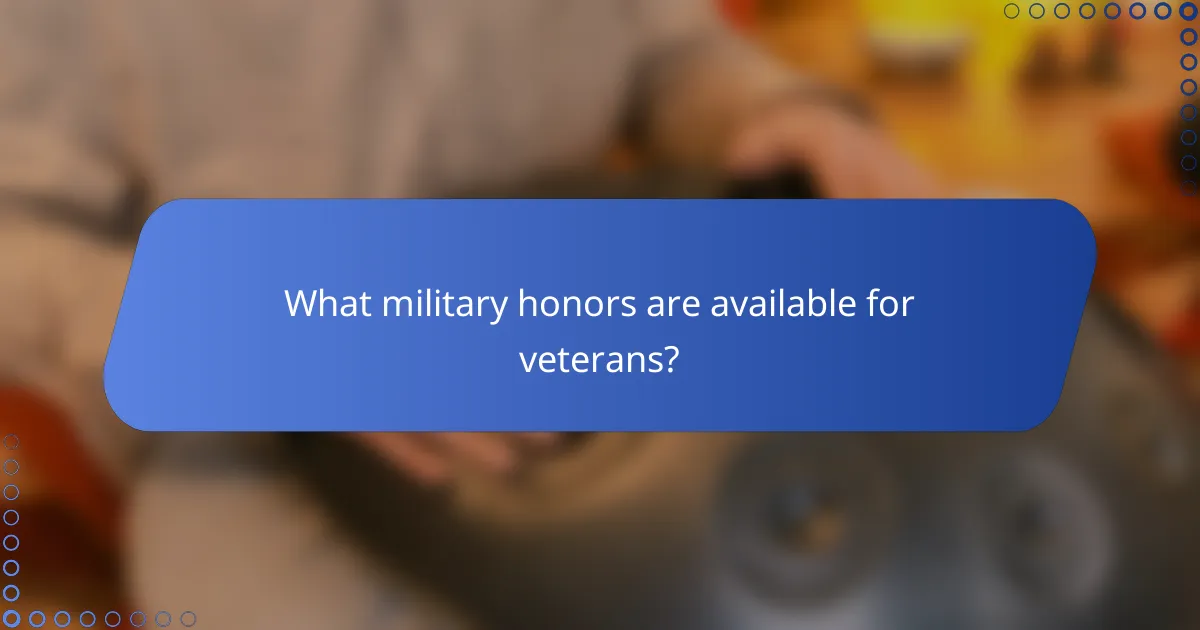
What military honors are available for veterans?
Veterans are entitled to various military honors that recognize their service and sacrifice. These honors can include ceremonial elements such as flag presentations, military chaplain services, and participation by an honor guard, along with the display of medals and insignia.
Flag presentation at the service
A flag presentation is a significant honor at a veteran’s funeral, symbolizing their service to the country. Typically, a U.S. flag is folded and presented to the next of kin during the service, often accompanied by a brief explanation of the flag’s meaning.
To arrange for a flag presentation, families should contact the funeral home or the Department of Veterans Affairs (VA) to ensure eligibility and proper procedures are followed. It is advisable to request the flag well in advance of the service to avoid any last-minute issues.
Military chaplain services
Military chaplain services provide spiritual support and guidance during a veteran’s funeral. Chaplains can conduct religious ceremonies, offer prayers, and provide comfort to grieving families, reflecting the veteran’s faith and service.
Families can request a military chaplain through the funeral home or directly from the local military installation. It is important to communicate any specific religious preferences or traditions to ensure the service aligns with the family’s wishes.
Honor guard participation
An honor guard is a ceremonial unit that pays tribute to the deceased veteran, often performing a rifle salute and presenting the flag. Their participation adds a solemn and respectful atmosphere to the funeral service.
To arrange for an honor guard, families should coordinate with the funeral director or the VA. Availability may vary by location, so it is best to make these arrangements early to secure the desired level of military representation.
Medals and insignia display
Displaying a veteran’s medals and insignia at the funeral is a meaningful way to honor their service. Families can showcase these items on a table or in a display case during the service, allowing attendees to recognize the veteran’s achievements.
To prepare for this display, families should gather the veteran’s medals, ribbons, and any other relevant insignia. It is advisable to clean and arrange these items thoughtfully, as they represent the veteran’s dedication and sacrifices throughout their military career.
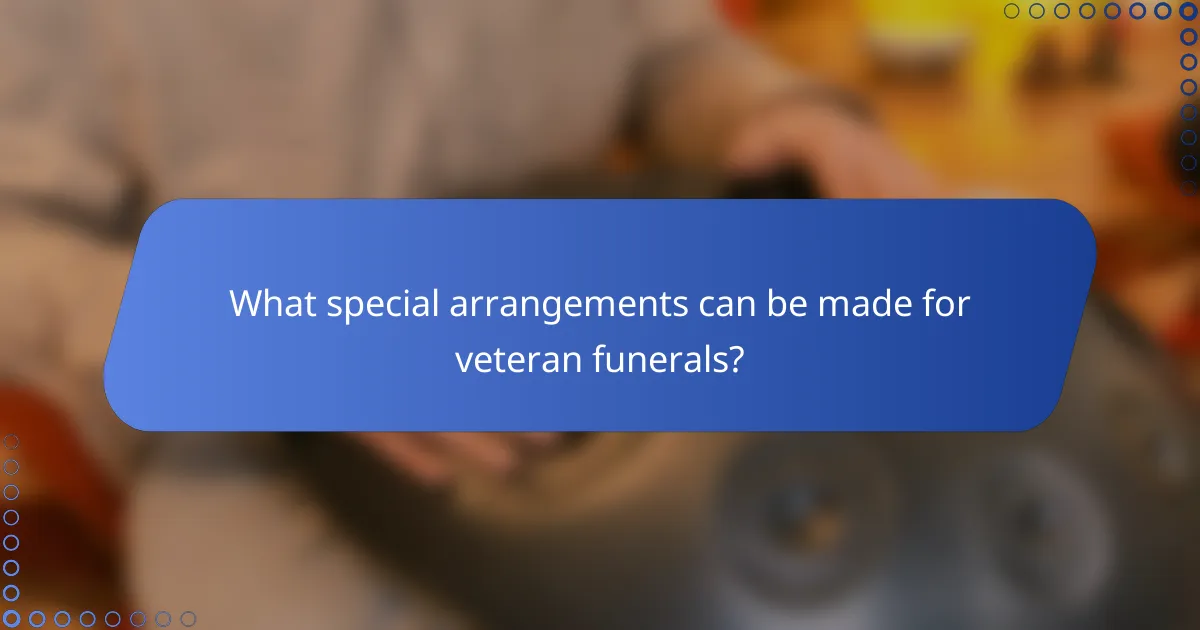
What special arrangements can be made for veteran funerals?
Veteran funerals can include various special arrangements to honor the service and sacrifice of the deceased. These arrangements may encompass personalized memorial services, military-themed caskets, special transportation, and burial in veterans’ cemeteries.
Personalized memorial services
Personalized memorial services allow families to create a unique tribute that reflects the veteran’s life and service. This can include incorporating military honors, such as the playing of Taps, a flag presentation, or a ceremonial rifle salute.
Families can also choose to include personal touches, such as displaying photographs, sharing stories, or including favorite music. Engaging a funeral director experienced with veteran services can help ensure these elements are appropriately integrated.
Use of military-themed caskets
Military-themed caskets are available to honor the veteran’s service and can be customized with insignia or colors representing their branch of service. Options may include caskets adorned with the American flag or those featuring military emblems.
When selecting a casket, families should consider both the veteran’s personal preferences and any regulations that may apply, especially if burial is planned in a national cemetery.
Special transportation arrangements
Special transportation arrangements may be necessary to accommodate the needs of the family and the veteran’s remains. This can include military escort services, which provide a dignified procession to the funeral location.
Families should coordinate with the funeral home to ensure that all transportation needs are met, including any specific requirements for transporting remains to a veterans’ cemetery or other designated location.
Burial in veterans’ cemeteries
Burial in veterans’ cemeteries is a significant honor and is available to eligible veterans and their families. These cemeteries offer a final resting place that reflects the veteran’s service, often including headstones and markers provided at no cost.
To arrange burial in a veterans’ cemetery, families should gather necessary documentation, such as the veteran’s discharge papers, and contact the cemetery for specific guidelines and availability. It’s advisable to initiate this process early to ensure a smooth arrangement.

What are the prerequisites for veteran funeral benefits?
To qualify for veteran funeral benefits, individuals must provide proof of military service and documentation of their discharge status. These requirements ensure that the honors and benefits are reserved for those who have served in the armed forces.
Proof of military service
Proof of military service is essential to access veteran funeral benefits. This can typically be established through a DD Form 214, which is the Certificate of Release or Discharge from Active Duty. Other acceptable documents include military identification cards or service records that clearly indicate the individual’s service history.
When preparing for a veteran funeral, it’s advisable to gather these documents early. Having them on hand can expedite the process of securing benefits and honors, such as military honors at the funeral service.
Documentation of discharge status
Documentation of discharge status is another critical requirement for veteran funeral benefits. This documentation confirms the nature of the discharge, which can be honorable, general, or other types. An honorable discharge typically qualifies for full benefits, while other statuses may have varying eligibility.
To obtain the necessary documentation, veterans can request their discharge papers from the National Archives or their respective military branch. It’s important to ensure that this paperwork is accurate and complete to avoid delays in accessing funeral benefits.
